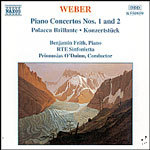
Piano Concertos Nos. 1 and 2 / Pollaca Brillante / Konzertstuck in F minor
 $25.00
Out of Stock
$25.00
Out of Stock2-4 weeks add to cart
WEBER
Piano Concertos Nos. 1 and 2 / Pollaca Brillante / Konzertstuck in F minor
Benjamin Frith (piano) / RTE Sinfonietta
[ Naxos / CD ]
Release Date: Tuesday 16 November 2004
This item is currently out of stock. We expect to be able to supply it to you within 2 - 4 weeks from when you place your order.
"Benjamin Frith approaches Weber with an engaging freshness and willingness to take risks... attractive and original performances"
- Gramophone
"The RTE band plays well enough... Frith virtuosity continues to impress in this... The music speaks for itself."
- BBC Music Magazine - March 1996
"Benjamin Frith approaches Weber with an engaging freshness and willingness to take risks... attractive and original performances"
- Gramophone
There is an operatic element in much of the music of Weber, composer of the first great German romantic opera, Der Freischütz. Much of the childhood of Carl Maria von Weber had been spent travelling with the theatrical company directed by his father, Franz Anton Weber, uncle of Mozart's wife Constanze and like his brother, Constanze's father, at one time associated with the famous Mannheim orchestra. At the time of Weber's birth his father was still in the service of the Bishop of Lübeck and during the course of an extended visit to Vienna had taken a second wife, an actress and singer, who became an important member of the family theatre company established in 1788.
Weber's musical gifts were fostered by his father, who saw in his youngest son the possibility of a second Mozart. Travel brought the chance of varied if inconsistent study, in Salzburg with Michael Haydn and elsewhere with musicians of lesser ability. His second opera was performed in Freiberg in 1800, followed by a third, Peter Schmoll und seine Nachbarn (Peter Schmoll and His Neighbours), in Augsburg in 1803. Lessons with the Abbe Vogler led to a position as Kapellmeister in Breslau in 1804, brought to a premature end through the hostility of musicians long established in the city and through the accidental drinking of engraving acid, left by his father in a wine-bottle.
Tracks:
Piano Concerto No. 1 in C major, Op. 11 (J.98)
Piano Concerto No. 2 in E flat major, Op. 32 (J.155)
Polacca Brillante (L'hilarite) in E major, Op. 72 (J.268)
Konzertstuck in F minor, Op. 79 (J.282)
